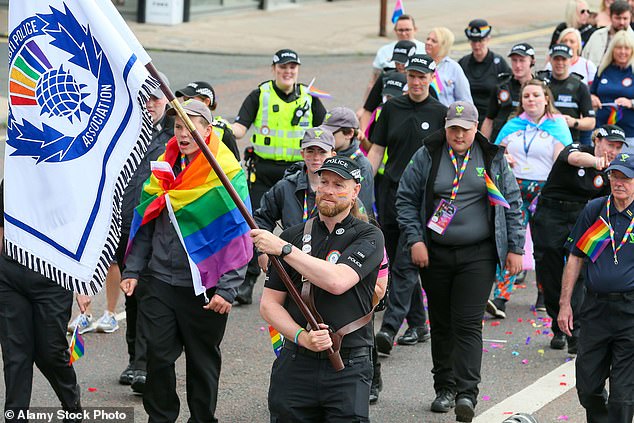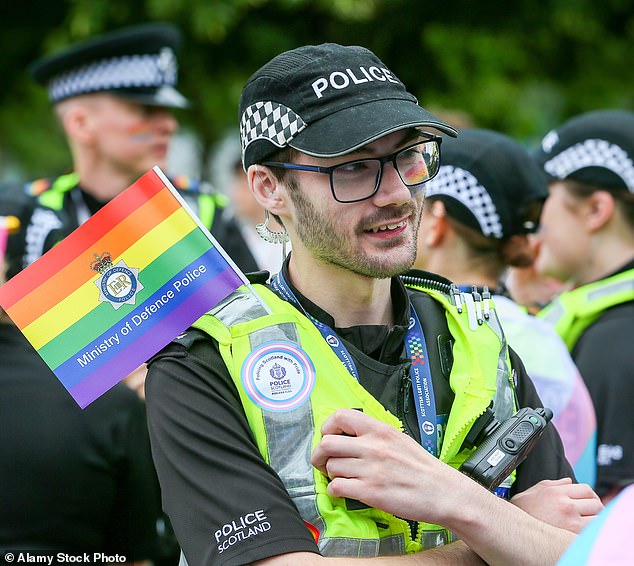Police officers in uniform will not take part in a Pride event in Scotland’s biggest city on Saturday following a landmark High Court judgment.
The Mail revealed yesterday that bosses of the force faced mounting pressure to ban officers from participating in the controversial marches.
On Wednesday, the High Court ruled that Northumbria Police, one of Britain’s largest forces, breached impartiality by marching at an LGBT+ event.
On Friday Police Scotland Deputy Chief Constable Alan Speirs said no uniformed officers would march at Pride in Glasgow today – in contrast with the situation last year, when dozens of officers were paid to take part.
It is understood that a decision had been taken not to participate prior to the court ruling – but plans for minor ‘engagement’ were dropped after the High Court judgment.
This could have included officers manning stalls or taking part in related events at the Pride march.
Last night Scottish Tory community safety spokesman Sharon Dowey said: ‘This is a welcome decision by Police Scotland.
‘Given the SNP’s sustained cuts to frontline policing, it is common sense that resources should be directed towards keeping people safe.’

Police officers have previously marched in uniform during a Pride event in Glasgow

Officers are not allowed to wear uniform in today’s Pride march in Glasgow
Explaining the police position, Mr Speirs said: ‘Police Scotland has vast experience in policing events and in the coming days we will continue to do so in a professional, engaging, and proportionate manner.
‘Glasgow’s Pride will be no different and we will continue to engage closely with event organisers, although no officers will participate in forthcoming events in uniform.
‘We continue to review the UK High Court judgment on Northumbria Police’s participation in Newcastle Pride 2024 and its implications.
‘We will ensure Police Scotland’s response to events continues to be in line with our values and code of ethics, providing a professional and impartial service which upholds the human rights of all.’
The Scottish Police Federation (SPF), representing rank-and-file officers, and former senior officers, had backed the High Court ruling earlier this week, piling pressure on top brass to ban uniformed police participation in Pride events.
Last night SPF general secretary David Kennedy said it ‘proudly supports the principles and values of the Pride movement, including equality, inclusion, and the right of all individuals – regardless of their sexual orientation or gender identity – to live free from discrimination and prejudice’.
But he added that ‘we also support the operational judgment that police officers should not march in uniform while on duty at Pride events’.
Mr Kennedy said: ‘Participating in any march while on duty, including Pride, can give rise to questions around neutrality and may impact perceptions of police objectivity.
‘Officers who wish to take part in Pride events in their own time should be supported and encouraged to do so, and we welcome efforts to facilitate this wherever possible.
‘Supporting Pride and supporting operational clarity are not mutually exclusive—we believe both can, and should, co-exist.’
Welcoming the High Court ruling, Kate Barker, chief executive of LGB Alliance, the UK’s only LGB charity (excluding transgender people) said last night: ‘LGB people have been deeply distressed by how it has become hijacked by gender identity ideology in recent years.’
In July last year, the Mail revealed that police officers in Scotland were paid to take part in Pride parades despite the force cutting back on fighting crime.
Uniformed officers were urged to represent the overstretched force at LGBT+ events in exchange for either pay or a day off in lieu.
Meanwhile, the Mail can also reveal that officers have signed Pride flags in a show of solidarity with the LGBT+ movement.
In 2023, officers were photographed signing flags as part of Pride Month.
Argyll and West Dunbartonshire officers marked the occasion by signing a Pride flag which was sent round police stations.
Chief Superintendent Lynn Ratcliff, who was the final person to sign it to show she was an LGBT+ ‘ally’, said she wanted her division to be the ‘most inclusive area in Police Scotland’.
In 2022, a Pride flag was sent round police stations in Edinburgh to ‘allow officers to sign it to show support to LGBT colleagues and communities’.
Last night Kath Murray of gender-critical think-tank Murray Blackburn Mackenzie said it is ‘hard to think of a clearer example of institutional capture than literally signing allegiance’ to the Pride flag.











